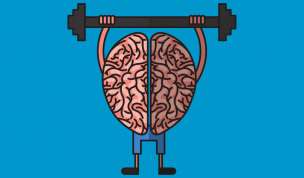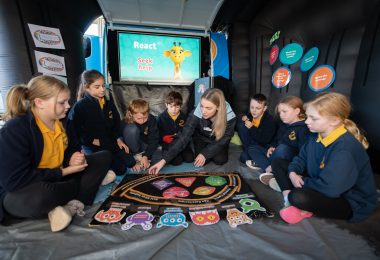How to teach resilience and help yout child

Remember playing Pass the Parcel as a child? The music stopped, the child left holding the parcel would remove one sheet of wrapping and pass the parcel on. Deep in the folds of paper at the centre of the parcel was a small toy or treat; a single prize for the child who removed the last piece of wrapping.
Watching four-year-olds playing the game at a birthday party recently, I wasn’t surprised to see a tiny toy under each and every layer of paper. Or that the mum in charge intentionally stopped the music only when the parcel reached a child who hadn’t yet unwrapped a prize.
But as usual, someone started the conversation: “Since when does everyone get a prize? They’ll never learn to be resilient if they always win!”
Resilience is a hot word at the moment, generally understood to mean the ability to bounce back from disappointment and to adapt to things we can’t change. While it’s a vital trait we all wish for our kids, the act of teaching our children resilience can be hard for parents who naturally want to protect their child from failure and disappointment.
Edith Grotberg, a senior researcher with the International Resilience Project, says ‘Resilience is important because it is the human capacity to face, overcome and be strengthened by or even transformed by the adversities of life. Everyone faces adversities; no one is exempt. With resilience, children can triumph over trauma; without it, trauma (adversity) triumphs’.
Everyone faces adversities
Sadly, some children will encounter more challenges and even trauma in their lives than others. As much as you love and nurture your child now, there’s no way to protect them from everything that could go wrong. The good news is you can help prepare them for life’s storms, because resilience is a “work-in-progress” and something that we can continue to develop throughout our lives.
What helps a child be resilient? There are many factors including knowing you have a family who love you and can be depended on to help and support you.
Equally important though, are qualities such as optimism and problem-solving skills, and the understanding that most disappointments are temporary and can be endured.
Five ways to help your child adapt to challenges
1. Read young children stories that demonstrate resilience. The “Little Engine That Could” is an old favourite you can act out with your child’s toys. The Little Engine struggled to get over the hill with her heavy load of toys and treats for the children in the next town. All the while she said “I think I can, I think I can” as she pushed on up the hill. Maybe she made a game out of it, and said to herself, “If I can just get past the next tree I’ll be nearly there” then “If I just get past the herd of cows, I’ll be even closer” until she was up and over the hill.
2. Look for examples of hardship and resilience when watching movies with children. Ask them questions about the problem-solving strategies the characters used to reach their goals. Hollywood loves a good resilience plot, from Jimmy Neutron – Boy Genius to The Hunger Games.
Questions like “How do you think Katniss felt when that happened?” help your teen empathise with the character and understand that frustration and anger are feelings that can be channelled into solving problems and positive actions.
3. Don’t accommodate every need your child expresses. My 13 year old begged to stay with his cousins up the coast, during the school holidays. A day later he called and said he’d changed his mind and wanted to come home early. I understood he was outside his comfort zone, (and I suspect he was missing his PlayStation possibly more than he was missing me).
As much as I wanted to “make it all better” and relieve his anxiety, my husband reminded me that it was a growth experience for our son. He was perfectly safe and well cared for, and he’d regret coming home without having done all the exciting things they had planned.
As you’ve probably guessed, when I eventually picked my son up from the airport he was full of stories of his adventures away and planning his next trip north.
4. Let your child make mistakes. When children learn to read it can be almost painful to sit with them and watch them struggle to make sense of the letters on the page. That struggle is actually what learning looks like. Your patience in letting them sound the words out in their own time, gently prompting them to look at the picture and to “have a go” at the words is how you support their learning. But you can’t “give” them the words, because that’s robbing them of the opportunity to make a mistake, learn and succeed. To quote Henry Ford, “Failure is just a resting place. It is an opportunity to begin again more intelligently.”
5. Put disappointments into perspective. How we explain things to ourselves in times of crisis can greatly affect how we process and learn from those events. Useful messages include:
- Life isn’t always going to go the way we want. Sometimes things will not go our way, but we will cope.
- No one is perfect, we all make mistakes and we learn from those.
- We all have our strengths and are better at some things than others.
- Most disappointments are temporary and will become less important to us with time.
- Most problems only affect a small part of our lives – we still have other skills, other friends, other things to look forward to.
Even if this can be hard for a parent, children also need to experience disappointment to then feel the satisfaction and pride that comes from successfully navigating a challenging situation. Sometimes that will mean problem-solving their way out of it, sometimes it will mean enduring and learning from it, but it is still important to help your children navigate their way through those feelings as they learn to develop and build on their coping skills.
So back to The Great Pass The Parcel Debate. I personally don’t mind if every child gets a prize. If you want to teach your child that life isn’t fair, an adrenaline-filled, four-year old’s birthday probably isn’t the best place to start. Over-excited kids full of party food don’t tend to learn the big life lessons terribly well, and melt-downs are more likely than a-ha moments.










